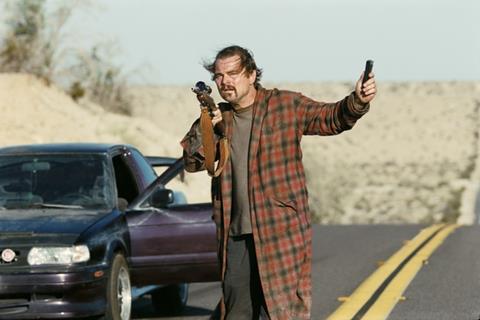Leonardo DiCaprio’s latest film combines stunning cinematography and note-perfect performances with prescient themes of revolution, fascism and political division. Here’s why Christians should engage with it

When the Oscar nominations are announced in January, expect to hear the name One Battle After Another. A lot. Make no mistake, director Paul Thomas Anderson, the cast, score and cinematography are going to rake in the nominations. It’s a sprawling drama about fascism, rebellion, family and race; it’s crass and insightful, funny and thrilling, timeless and searingly relevant.
It’s the kind of art that demands attention, so by extension it’s the sort of cinema that Christians who want to engage with culture should rush to see. One Battle After Another earns its 15 rating with some crude, non-explicit sexual content in the first half hour of the film, bursts of violence and a lot of swearing throughout - but look beyond the abrasive exterior and you will be rewarded with a film that leads to extensive opportunity for conversation and reflection.
This isn’t a film about faith, but it is a film about how passion for a cause can peter out over time
It is also - thematic resonance aside - a masterful piece of craftsmanship, with stunning cinematography, note-perfect performances and an all-time-great car chase. If nothing else, you should see it to witness a director at the absolute height of his - and cinema’s - powers.
The film is a loose adaptation of Thomas Pynchon’s novel Vineland (Vintage Classics) and follows a useless left-wing revolutionary known as Pat (or Ghetto, or Bob) played by Leonardo diCaprio. After a botched bank robbery, he flees with his daughter to evade the relentless pursuit of Colonel Steven Lockjaw (Sean Penn). But his past eventually catches up with him, and his daughter starts trying to break free from his paranoid parenting.
Contemporary caricatures
In such a politically divisive moment, Anderson’s latest epic barrels into cinemas with a story of revolution. Its opening scene is set in a migrant detention centre on the Mexican border, with children kept in cages - a scene straight from the headlines. Fascism and revolution are the texture and backdrop that this film inhabits.
Miiltary goons use flimsy excuses to crack down on immigrant-run businesses, people are disappeared off the street and race charges every interaction between the state and its people. The film opens in the modern day, and then jumps 16 years into the future, but it never stops being an America that we recognise from the news.
While all of the protagonists are complicated characters, the evil antagonists are not. Take the comical white supremacist group pulling the strings behind the scenes, with secret meetings in labyrinthine basements. Or Colonel Lockjaw, a racist, deviant creep who walks with a gait that is almost a parody of military marching. These are not nuanced depictions of villains that attempt to understand them, they are absurd and straightforwardly evil.
They would almost be caricatures - if they did not feel so uncomfortably close to reality. Since coming into power, the current US administration has used Immigrations and Customs Enforcement (ICE) to disappear people and sometimes to deport them without charge. It is now making moves to send the army into cities with a different political outlook. These are the hallmarks of fascism and autocracy, and Anderson turns his camera on them with unflinching moral clarity.
Detractors and democrats
Detractors of the film will want to dismiss this as woke nonsense, or dangerously stoking the flames. Ben Shapiro even suggested that the film “promotes violence against ICE.” But that is to wilfully misread it, even at face value, when there is a lot more going on beneath the surface.
This is not a partisan film, in that it is not pro-democratic, or pro any one particular stance. DiCaprio’s protagonist Bob is comically useless - a constant passenger on the crazy ride that this film takes you on. Everything happens to him without him ever impacting a story. Once things go awry, he taps out of the revolution and chooses instead to drink and smoke weed.
It’s the kind of art that demands attention, so by extension it’s the sort of cinema that Christians who want to engage with culture should rush to see
I’ve not even mentioned yet how funny this film is, but it’s absolutely hilarious. Bob is a buffoon, a man totally unsuited for the moment and ultimately more interested in self-preservation – not that he’s even any good at that.
The other revolutionaries aren’t up to much either - firebrand Perfidia Beverly Hills (there are a lot of character names like that) compromises everything through her sexual fascination with a villain, while the chaos of their group, the French 75, reminded me of the Onion headline: “Left-Wing Group Too Disorganised for FBI Agents to Infiltrate.”
There may be villains in this film, but the heroes are self-interested, chaotic and human - and they are certainly not capital-D Democrats.
The next generation
Instead, the film uses its searingly contemporary setting to explore richer universal themes - such as how we mellow as we age, and how parenthood can cause us to change our perspectives on risk and revolution. For all its nods to modern politics, this is a film about the melancholy of moral compromise, and what that looks like in a world which sometimes feels absurd, cruel and relentless.
Ultimately, after all the thrills, laughs and horrors, One Battle After Another ends on an emotional, tender note. It suggests that while we may grow tired of fighting for what is right - and often find other things to prioritise - there is always another generation ready to bear the torch for us.
That could be true politically, but perhaps it also speaks to our faith. This isn’t a film about faith - it’s barely mentioned in any context - but it is a film about how passion for a cause can peter out over time, and as circumstances wear away at our enthusiasm. In Chris Renzema’s song, ‘17’, he reflects on his youthful fervour, singing: “Feel like I was so much wiser when I was seventeen / Saw the world in just two shades, didn’t stand in the in-between.”
I’m sure many of us have felt this. Perhaps there were Christian issues you used to champion. Perhaps you used to burn with a passion for evangelism. But, over time, your enthusiasm has waned - often for valid reasons, or because nuance, doubt or disappointment has chipped away at your sense of purpose.
One Battle After Another explores this idea, albeit in relation to politics, not faith. Nonetheless, it offers a moment of solace at the end. When our zeal begins to fade, and when we are tempted to care more about comfort, perhaps the next generation will pick up from where we left off.
































